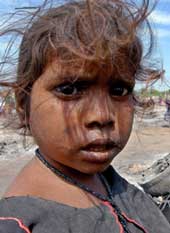Water wider than a forest
 |
only the sea keeps: poetry of the tsunami (Rupa, Rs 195) edited by Judith R. Robinson, Joan E. Bauer and Sankar Roy is a collection of poems, mainly by American writers, about the impact of the December 2004 calamity on human lives and on the human imagination. ?How do you explain water wider than a forest,? writes Luisa Rossina Villani, ?to children who trust in trees?? (?The Astronomer Behind His Eyes?). In ?Meditations of the Sabbath?, Philip Terman tells us: ?Sometimes a grief is so large/ we are unable to scale it/ and lose ourselves in our distraction ?/ leaves revolving in the restless air...? Poetry has always attempted to address human extremity, putting language itself through enormous risks. The eighty-odd poets, some of them quite widely published, have courageously taken this risk, with varying results. Profits from the sales of this book will be donated to relief agencies.
younguncle comes to town & younguncle in the himalayas (Zubaan/Puffin, Rs 150 and Rs 175) by Vandana Singh are two slim novels (one hopes in a continuing series) for young readers about three children (Sarita, Ravi and the baby) and their father?s younger brother, who was said to have been kidnapped by the monkeys when he was little. Younguncle arrives, and the children realize that their lives would never be the same again. In the book, the children are with Younguncle at the gloomy and mysterious Hotel Pine-Away, as he chats with monkeys and debates the true nature of reality with an off-beat sect of Quantum Banana spiritualists.
tin fish (Penguin, Rs 250) Sudeep Chakravarti is about Fish, Porridge, PT Shoe and Brandy ? ?brothers without barriers, friends until death? ? who are thrown together, in mid-teenage, in a boarding school in Rajasthan. This is India in the Seventies, and the boys come of age lusting after ?gora chicks?, writing musicals and trying to make sense of paternal bigotry, urine therapy, the Emergency and death.
seven summers: a memoir (Penguin, Rs 250) by Mulk Raj Anand, first published in 1951, recreates the events and feelings of the first seven years of the writer?s life, or what he calls his ?half unconscious and half conscious childhood?. This is the first of the seven volumes of autobiographical fiction that Anand planned but never completed. Perhaps the most memorable episode in it is the Coronation Durbar in Delhi to which the young Anand is smuggled in, wrapped in a blanket, so that the sahibs might not object to the presence of ?so discordant an element into so gorgeous a ceremony?.
 |
bollywood uncensored: what you don?t see on screen and why? (Rupa, Rs 195) by Derek Bose could have been a good book if it had been written with a little more care, for it raises important ethical, political and aesthetic issues, relevant to modern India and its visual pleasures. Between self-regulation and the State?s moral policing, it offers a third alternative: the censor board playing an advisory role, rating rather than censoring films. There is an interesting section on politicized censorship of documentary films. The books make a commercially judicious use of stills from censored film sequences.











